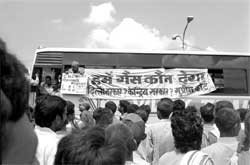Polluting game
Polluting game

just as the Supreme Court's deadline for converting Delhi's public transport system to compressed natural gas (cng) mode is getting closer, Ram Naik, Union minister for petroleum and natural gas (mopng), is raising uncertainties in the consumer's mind regarding the viability of the ecofriendly fuel. A flurry of statements by Naik, such as "any diversion of the committed supplies of cng from vital sectors like power and fertiliser would affect them adversely', are evidence of m o png' s disinterest in dealing with the long queues for cng.
"It is shocking that even after getting a time period of three years for the conversion, the petroleum minister claims that very little gas is available for the city's transport fleet. This is totally contrary to the information that Indraprastha Gas Limited (igl) has provided to the court,' says Anil Agarwal, chairperson of the Centre for Science and Environment (cse), a Delhi-based non-governmental organisation.
Even the Environment Pollution (Prevention and Control) Authority set up by the apex court claims that "the government's attitude is impeding the effective implementation of the court's order.' According to cse , igl under pressure from m o png is dragging its feet to meet commitment of setting up 80 new cng stations. In April 2001, igl had stated that its total dispensing capacity is and will remain ahead of the demand. It had also claimed that by August 2001, there would not be any more queues. But soon after, on July 14, 2001, the then managing director of igl was dismissed and with a change of guard, new projections have been floated, which are nowhere near the claims made by igl in April. "This is a clear indication of the oil industry's influence on the ministry,' says Agarwal.







